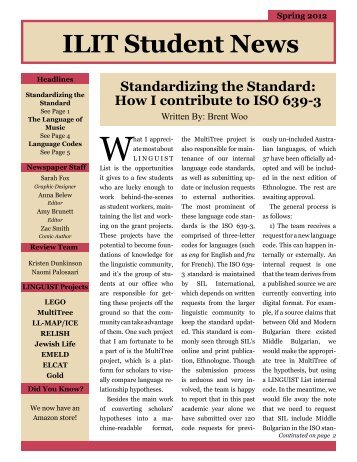

Foreign language teachers can work with classes that contain multiple students or with individual students on a one-on-one basis. Primary duties: A foreign language teacher is an educator who helps students learn a new language. National average salary: $55,256 per year A translator might work for a government agency, public facility or in any position that works with people who speak multiple languages to facilitate communication and provide translations for written documents, oral conversations and more. Translators are typically experts in at least two languages, but many translators have expertise in a wide variety of languages.
Linguist list professional#
Primary duties: A translator is a linguistic professional who translates text and communications from one language to another. National average salary: $46,135 per year Many copy editors work for companies that produce large amounts of content or marketing materials, but they can also work for written publications, advertising agencies or on a freelance basis.

Copy editors can proofread text for grammar, correct syntax and sentence structure and can edit documents to improve their clarity. Primary duties: A copy editor is a writing professional who edits copy and written documents for accuracy. National average salary: $34,506 per year Many linguists also work for companies that provide editing services for written documents and can help with details like localization, grammar and sentence structure. Linguists might specialize in a particular language and research it in-depth, or they might specialize in a concept of language, like history or syntax. Primary duties: A linguist is a specialist who researches and evaluates different aspects of language. National average salary: $24,657 per year Here are 10 jobs you can get with a degree in linguistics: 1. 10 jobs you can apply for with a linguistics degree All of these can inform your understanding of your own language as well as how other languages in different locations function differently or in similar ways. Some courses that linguistics students might take include phonetics, morphology, syntax and historical linguistics. Students who major in linguistics typically earn a Bachelor of Arts degree that trains them in the basics and complicated concepts that surround language. Linguistics is the study of languages and the technical aspects of how they're used in different ways across communities.
Linguist list how to#
Related: How to List Language Levels on Your Resume What is a linguistics degree? In this article, we explore 10 jobs you can qualify for with a degree in linguistics. You might thrive in a linguistics job if you have an interest in languages and want to engage in the scientific aspects of language. Many careers in linguistics offer exciting opportunities to learn about different patterns and concepts in language that affect their uses around the world.

Whether you study full-time in Cambridge or part-time by distance learning, this postgraduate degree opens up opportunities for you to become part of the international academic and professional English Language teaching and language-learning community.Linguistics is the study of language and how it's used. We’ll also help you make valuable contacts for your future through our links to language companies such as EF, Bell, and Studio, a group for heads of language schools. Studying Applied Linguistics and TESOL will give you the chance to take part in our research seminars and high-profile conferences. You’ll be able to use the critical-evaluative skills you develop on your own research project at the end of the course, as well as in your future career. Your studies will be supported throughout by our research-active and industry-experienced academics, including DELTA-qualified professionals.Īnd if you already have the Delta or Trinity TESOL Diploma, we will give you 60 credits towards your degree.Īs a Master's student at ARU, we’ll help you learn to carry out your own research and how to compile and analyse quantitative and qualitative data. You’ll explore the latest theories in topics such as second language acquisition and classroom theory and practice, examining different methods of analysis. In this course, you’ll improve your theoretical understanding of language learning, which will help you to develop your professional teaching skills. Study our MA Applied Linguistics and TESOL (Teaching English to Speakers of Other Languages) in Cambridge, a city famous for language teaching, and boost your career prospects with new critical and analytical skills. Explore the latest linguistics theories and apply them to your classroom practice. Advance your career in language teaching, or even take it internationally.


 0 kommentar(er)
0 kommentar(er)
